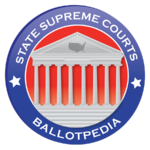Help us improve in just 2 minutes—share your thoughts in our reader survey.
Judicial selection in Kansas
| Judicial selection in Kansas | |
 | |
| Kansas Supreme Court | |
| Method: | Assisted appointment |
| Term: | 6 years |
| Kansas Court of Appeals | |
| Method: | Gubernatorial appointment |
| Term: | 4 years |
| Kansas District Courts | |
| Method: | Assisted appointment or Partisan election |
| Term: | 4 years |
Judicial selection refers to the process used to select judges for courts. At the state level, methods of judicial selection vary substantially in the United States, and in some cases between different court types within a state. There are six primary types of judicial selection: partisan and nonpartisan elections, the Michigan method, assisted appointment, gubernatorial appointment, and legislative elections. To read more about how these selection methods are used across the country, click here.
This article covers how state court judges are selected in Kansas, including:
As of April 2025, judges in Kansas were selected through a variety of methods. Supreme court justices and certain district court judges are selected through assisted appointment where a judicial nominating commission presents a list of nominees to the governor who then picks an appointee. Intermediate appellate court judges are selected through gubernatorial appointment with the consent of the Kansas State Senate. Certain district court judges are also elected through partisan elections.[1]
Click here to notify us of changes to judicial selection methods in this state.
Kansas Supreme Court
- See also: Kansas Supreme Court
The seven justices on the Kansas Supreme Court are selected through the assisted appointment method. The Kansas Supreme Court Nominating Commission is responsible for providing the names of nominees to the governor, who must then select a justice from that list.[2] The commission is made up of nine members, one lawyer and non-lawyer from each congressional district and one additional lawyer who serves as chairperson. The four non-lawyers are appointed by the governor. Four lawyers are elected by members of the Kansas State Bar in each congressional district. The fifth lawyer is elected by a statewide vote of members of the Kansas State Bar.[2]
Newly appointed justices serve for at least one year, after which they must stand for retention in the next even-year general election. If retained, the justice serves a six-year term and must stand for retention every six years after that point to remain in office.[2]
Qualifications
To serve on this court, a judge must:[2]
- have at least 10 years of active and continuous law practice in the state;[3]
- be at least 30 years old; and
- be no older than 75. If a sitting judge turns 75 while on the bench, he or she may serve out the term.
Chief justice
The court's chief justice is chosen by seniority. He or she is the longest-serving justice on the court and serves as chief indefinitely.[4] Upon his or her retirement, the justice with the next-longest tenure on the court becomes chief justice.
Vacancies
If a midterm vacancy occurs on the court, the seat is filled as it normally would be if the vacancy occurred at the end of a judge's term. A judicial nominating commission recommends qualified candidates to the governor and the governor selects a successor from that list. The new appointee serves for at least one year and then stands for retention.[5]
The map below highlights how vacancies are filled in state supreme courts across the country.
See also
External links
Footnotes
- ↑ 1.0 1.1 1.2 1.3 1.4 1.5 CyberCivics, "Kansas Court of Appeals," accessed Sept. 24, 2021
- ↑ 2.0 2.1 2.2 2.3 2.4 Supreme Court Nominating Commission, "Filling a Supreme Court vacancy," Aug. 6, 2020
- ↑ This may include work as a lawyer, judge, or full-time teacher at an accredited law school.
- ↑ 4.0 4.1 4.2 4.3 Our Kansas Courts, "Judicial Selection," accessed Sept. 24, 2021
- ↑ Kansas Judicial Branch, "Kansas Supreme Court," accessed June 21, 2021
- ↑ This may include work as a lawyer, judge, or full-time teacher at an accredited law school.
- ↑ Kansas Judicial Branch, "Court of Appeals," accessed March 31, 2023
- ↑ Kansas Judicial Branch, "Become a Judge Through Merit Selection," accessed Sept. 24, 2021
- ↑ Kansas Judicial Branch, "Become a Judge Through Election," accessed Sept. 24, 2021
- ↑ 10.0 10.1 Kansas Judicial Branch, "Become a Judge Through Merit Selection," accessed Sept. 24, 2021
- ↑ This may include work as a lawyer, judge, or full-time teacher at an accredited law school.
- ↑ Kansas Judicial Branch, "About District Courts," accessed March 31, 2023
- ↑ Office of the Governor, "Governor Laura Kelly Appoints Magistrate Judge Andrea Cross to fill Court Vacancy in the 20th Judicial District," Sept. 1, 2021
- ↑ Kansas Legislature, "Article 41. - 12-4105. Municipal judge; appointment; qualifications; compensation.," accessed March 31, 2023
- ↑ Kansas Legislature, "Article 41. - 12-4114. Municipal judge, training programs; certification; examinations; continuing education requirement; duties of supreme court.," accessed March 31, 2023
- ↑ Kansas Judicial Branch, "Historical Listing of Supreme Court Justices," accessed Sept. 24, 2021
- ↑ Humanities Kansas, "TV, The Triple Play, and the Man from Dodge," accessed Sept. 24, 2021
- ↑ American Judicature Society, "History of Reform Efforts: Kansas; Formal Changes Since Inception," archived October 2, 2014
- ↑ U.S. Courts, "FAQ: Federal Judges," accessed March 26, 2015
- ↑ American Bar Association, "Judicial Selection: The Process of Choosing Judges," accessed August 10, 2021
Federal courts:
Tenth Circuit Court of Appeals • U.S. District Court: District of Kansas • U.S. Bankruptcy Court: District of Kansas
State courts:
Kansas Supreme Court • Kansas Court of Appeals • Kansas District Courts • Kansas Municipal Courts
State resources:
Courts in Kansas • Kansas judicial elections • Judicial selection in Kansas


